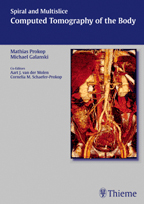Description
Whole body computed tomography has developed at a rapid pace in
the past decade, spurred on by the introduction of spiral and
multislice scanning. These new technologies have not only
improved diagnostic accuracy, but also made new applications
possible that were previously accessible only through
more complex or invasive techniques.
This new book expertly fills a gap in the literature by
combining the practi-
cally relevant technical background with the clinical
information required for correctly performing and interpreting
CT examinations. The book presents the state-of-the-art
capabilities and requirements of CT as a key diagnostic and
interventional tool, with special emphasis on the role of spiral
and multi-slice CT.
You will find a thorough introduction to CT technology from
scanner
design to 3D image reconstruction, useful practical hints on how
to optimize your examination protocols and how to keep the
radiation exposure of your patients to a minimum, as well as an
extensive clinical section in which symptoms, pathology and CT
morphology are integrated to provide you with
the basis for subtle interpretation of CT findings using the
most modern CT techniques.
Highlights include:
- Full coverage of single-slice, 4-slice and 16-slice scanning
techniques
- Introduction to extended CT applications including cardiac
CT,CT fluoroscopy,and 3D image processing
- Organ-specific protocols for scanning and contrast
administration
- Practical guidelines for maximizing image quality and
minimizing radiation exposure
- Useful suggestions for image interpretation and for avoiding
pitfalls
and errors
- Convenient format by organ system
and disease entity
- Full discussion of organ-specific pathology and CT morphology
- CT indications integrated with other imaging modalities
At a time when CT examinations are becoming more technically
demanding and complex, with an increasing number of scan
parameters and advances in 3D reconstructions, this book is an
essential professional tool. Experienced practitioners will find
their diagnostic and technical skills improved by reading the
book, and beginners will enjoy the clear, systematic approach
that will help them use the technique with confidence.


